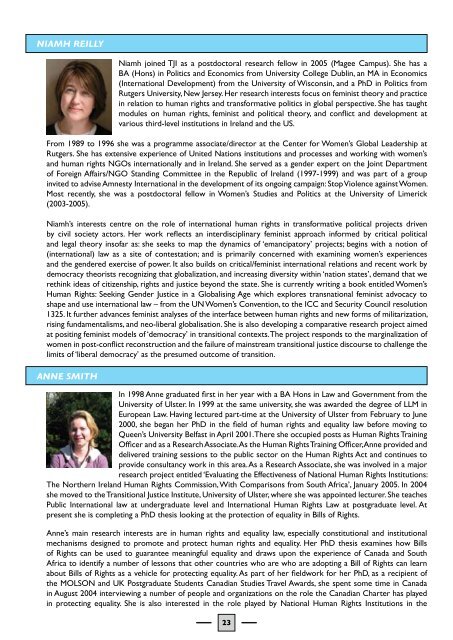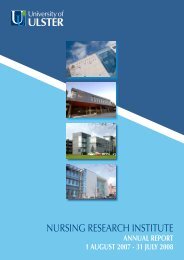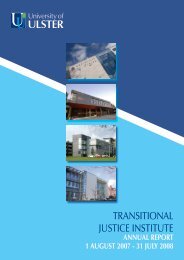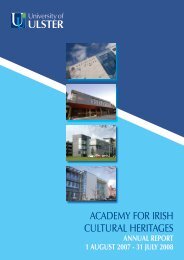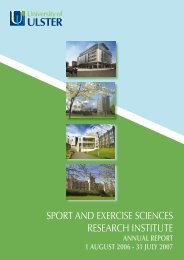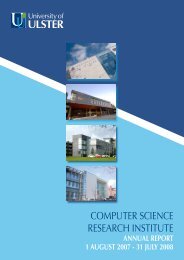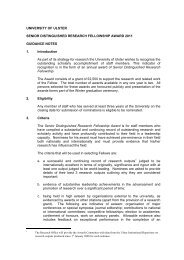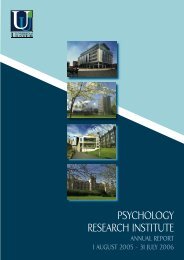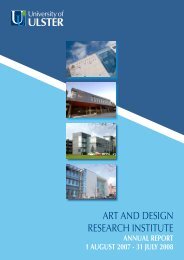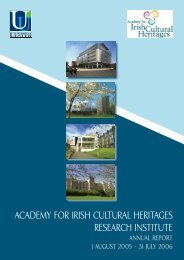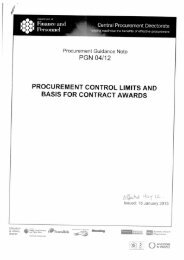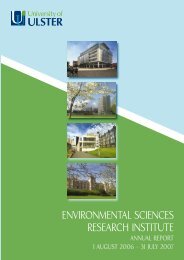transitional justice research institute - University of Ulster
transitional justice research institute - University of Ulster
transitional justice research institute - University of Ulster
You also want an ePaper? Increase the reach of your titles
YUMPU automatically turns print PDFs into web optimized ePapers that Google loves.
Niamh Reilly<br />
Niamh joined TJI as a postdoctoral <strong>research</strong> fellow in 2005 (Magee Campus). She has a<br />
BA (Hons) in Politics and Economics from <strong>University</strong> College Dublin, an MA in Economics<br />
(International Development) from the <strong>University</strong> <strong>of</strong> Wisconsin, and a PhD in Politics from<br />
Rutgers <strong>University</strong>, New Jersey. Her <strong>research</strong> interests focus on feminist theory and practice<br />
in relation to human rights and transformative politics in global perspective. She has taught<br />
modules on human rights, feminist and political theory, and conflict and development at<br />
various third-level institutions in Ireland and the US.<br />
From 1989 to 1996 she was a programme associate/director at the Center for Women’s Global Leadership at<br />
Rutgers. She has extensive experience <strong>of</strong> United Nations institutions and processes and working with women’s<br />
and human rights NGOs internationally and in Ireland. She served as a gender expert on the Joint Department<br />
<strong>of</strong> Foreign Affairs/NGO Standing Committee in the Republic <strong>of</strong> Ireland (1997-1999) and was part <strong>of</strong> a group<br />
invited to advise Amnesty International in the development <strong>of</strong> its ongoing campaign: Stop Violence against Women.<br />
Most recently, she was a postdoctoral fellow in Women’s Studies and Politics at the <strong>University</strong> <strong>of</strong> Limerick<br />
(2003-2005).<br />
Niamh’s interests centre on the role <strong>of</strong> international human rights in transformative political projects driven<br />
by civil society actors. Her work reflects an interdisciplinary feminist approach informed by critical political<br />
and legal theory ins<strong>of</strong>ar as: she seeks to map the dynamics <strong>of</strong> ‘emancipatory’ projects; begins with a notion <strong>of</strong><br />
(international) law as a site <strong>of</strong> contestation; and is primarily concerned with examining women’s experiences<br />
and the gendered exercise <strong>of</strong> power. It also builds on critical/feminist international relations and recent work by<br />
democracy theorists recognizing that globalization, and increasing diversity within ‘nation states’, demand that we<br />
rethink ideas <strong>of</strong> citizenship, rights and <strong>justice</strong> beyond the state. She is currently writing a book entitled Women’s<br />
Human Rights: Seeking Gender Justice in a Globalising Age which explores transnational feminist advocacy to<br />
shape and use international law – from the UN Women’s Convention, to the ICC and Security Council resolution<br />
1325. It further advances feminist analyses <strong>of</strong> the interface between human rights and new forms <strong>of</strong> militarization,<br />
rising fundamentalisms, and neo-liberal globalisation. She is also developing a comparative <strong>research</strong> project aimed<br />
at positing feminist models <strong>of</strong> ‘democracy’ in <strong>transitional</strong> contexts. The project responds to the marginalization <strong>of</strong><br />
women in post-conflict reconstruction and the failure <strong>of</strong> mainstream <strong>transitional</strong> <strong>justice</strong> discourse to challenge the<br />
limits <strong>of</strong> ‘liberal democracy’ as the presumed outcome <strong>of</strong> transition.<br />
Anne Smith<br />
In 1998 Anne graduated first in her year with a BA Hons in Law and Government from the<br />
<strong>University</strong> <strong>of</strong> <strong>Ulster</strong>. In 1999 at the same university, she was awarded the degree <strong>of</strong> LLM in<br />
European Law. Having lectured part-time at the <strong>University</strong> <strong>of</strong> <strong>Ulster</strong> from February to June<br />
2000, she began her PhD in the field <strong>of</strong> human rights and equality law before moving to<br />
Queen’s <strong>University</strong> Belfast in April 2001. There she occupied posts as Human Rights Training<br />
Officer and as a Research Associate. As the Human Rights Training Officer, Anne provided and<br />
delivered training sessions to the public sector on the Human Rights Act and continues to<br />
provide consultancy work in this area. As a Research Associate, she was involved in a major<br />
<strong>research</strong> project entitled ‘Evaluating the Effectiveness <strong>of</strong> National Human Rights Institutions:<br />
The Northern Ireland Human Rights Commission, With Comparisons from South Africa’, January 2005. In 2004<br />
she moved to the Transitional Justice Institute, <strong>University</strong> <strong>of</strong> <strong>Ulster</strong>, where she was appointed lecturer. She teaches<br />
Public International law at undergraduate level and International Human Rights Law at postgraduate level. At<br />
present she is completing a PhD thesis looking at the protection <strong>of</strong> equality in Bills <strong>of</strong> Rights.<br />
Anne’s main <strong>research</strong> interests are in human rights and equality law, especially constitutional and institutional<br />
mechanisms designed to promote and protect human rights and equality. Her PhD thesis examines how Bills<br />
<strong>of</strong> Rights can be used to guarantee meaningful equality and draws upon the experience <strong>of</strong> Canada and South<br />
Africa to identify a number <strong>of</strong> lessons that other countries who are who are adopting a Bill <strong>of</strong> Rights can learn<br />
about Bills <strong>of</strong> Rights as a vehicle for protecting equality. As part <strong>of</strong> her fieldwork for her PhD, as a recipient <strong>of</strong><br />
the MOLSON and UK Postgraduate Students Canadian Studies Travel Awards, she spent some time in Canada<br />
in August 2004 interviewing a number <strong>of</strong> people and organizations on the role the Canadian Charter has played<br />
in protecting equality. She is also interested in the role played by National Human Rights Institutions in the<br />
23


